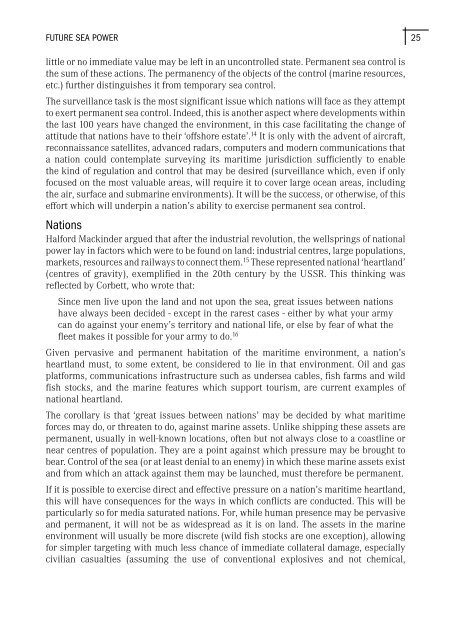Australian Maritime Issues 2005 - Royal Australian Navy
Australian Maritime Issues 2005 - Royal Australian Navy
Australian Maritime Issues 2005 - Royal Australian Navy
You also want an ePaper? Increase the reach of your titles
YUMPU automatically turns print PDFs into web optimized ePapers that Google loves.
FUTURE SEA POWER<br />
25<br />
little or no immediate value may be left in an uncontrolled state. Permanent sea control is<br />
the sum of these actions. The permanency of the objects of the control (marine resources,<br />
etc.) further distinguishes it from temporary sea control.<br />
The surveillance task is the most significant issue which nations will face as they attempt<br />
to exert permanent sea control. Indeed, this is another aspect where developments within<br />
the last 100 years have changed the environment, in this case facilitating the change of<br />
attitude that nations have to their ‘offshore estate’. 14 It is only with the advent of aircraft,<br />
reconnaissance satellites, advanced radars, computers and modern communications that<br />
a nation could contemplate surveying its maritime jurisdiction sufficiently to enable<br />
the kind of regulation and control that may be desired (surveillance which, even if only<br />
focused on the most valuable areas, will require it to cover large ocean areas, including<br />
the air, surface and submarine environments). It will be the success, or otherwise, of this<br />
effort which will underpin a nation’s ability to exercise permanent sea control.<br />
Nations<br />
Halford Mackinder argued that after the industrial revolution, the wellsprings of national<br />
power lay in factors which were to be found on land: industrial centres, large populations,<br />
markets, resources and railways to connect them. 15 These represented national ‘heartland’<br />
(centres of gravity), exemplified in the 20th century by the USSR. This thinking was<br />
reflected by Corbett, who wrote that:<br />
Since men live upon the land and not upon the sea, great issues between nations<br />
have always been decided - except in the rarest cases - either by what your army<br />
can do against your enemy’s territory and national life, or else by fear of what the<br />
fleet makes it possible for your army to do. 16<br />
Given pervasive and permanent habitation of the maritime environment, a nation’s<br />
heartland must, to some extent, be considered to lie in that environment. Oil and gas<br />
platforms, communications infrastructure such as undersea cables, fish farms and wild<br />
fish stocks, and the marine features which support tourism, are current examples of<br />
national heartland.<br />
The corollary is that ‘great issues between nations’ may be decided by what maritime<br />
forces may do, or threaten to do, against marine assets. Unlike shipping these assets are<br />
permanent, usually in well-known locations, often but not always close to a coastline or<br />
near centres of population. They are a point against which pressure may be brought to<br />
bear. Control of the sea (or at least denial to an enemy) in which these marine assets exist<br />
and from which an attack against them may be launched, must therefore be permanent.<br />
If it is possible to exercise direct and effective pressure on a nation’s maritime heartland,<br />
this will have consequences for the ways in which conflicts are conducted. This will be<br />
particularly so for media saturated nations. For, while human presence may be pervasive<br />
and permanent, it will not be as widespread as it is on land. The assets in the marine<br />
environment will usually be more discrete (wild fish stocks are one exception), allowing<br />
for simpler targeting with much less chance of immediate collateral damage, especially<br />
civilian casualties (assuming the use of conventional explosives and not chemical,

















